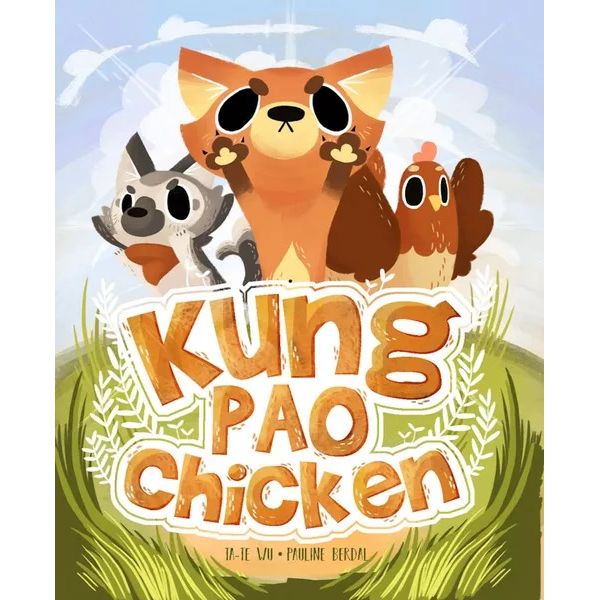Kung Pao Chicken: A Feather-Ruffling Social Deduction Game

Are you a chicken or a fox? You’d better figure it out fast, as each card you play will help determine how each team will score at the end of the round.
Published by Sunrise Tornado, Kung Pao Chicken is a social deduction card game, designed for 3-5 players and with a 20-minute playtime.
Gameplay
Fox cards and chicken cards, each equal to the number of players, are shuffled together. One card is dealt face-down to each player. The animal you get will be your identity for that round, but you cannot look at it. Instead, players simultaneously hold up their identity card so that everyone else can see it and then place them face-down again.
The remaining fox and chicken cards are shuffled back into the main deck. The deck of cards is then dealt out so that each player receives an equal number of cards, forming their hands. Any leftover cards in the deck are placed face-up in the center of the table at the field location card.
At the start of each round, all players pass a card to the player on their left or right (depending on the round number) and then do so again.
Next, players will take turns playing cards. On a player's turn, he will play any one card from his hand, face-down, to any location. Locations include any player’s personal barn area (including his own) or the field in the center of the table. The cards in the deck are chickens, foxes, or hounds.
When playing a card, the player may choose to reveal one of the face-down cards already at that location. If it is a fox, he may move it to any location that doesn’t have a face-up hound card.
Once everyone has played all their cards, the round ends. Players close their eyes and strike a pose to reflect if they believe they are a chicken or a fox. Everyone opens their eyes simultaneously and then reveals their identity cards. Each player who correctly guessed his own identity earns two points.
Next, all cards at all the locations are flipped face-up. For any location that has both foxes and hounds, you remove an equal number of each animal. For example, if there are two foxes and one hound, one fox and one hound are removed.
Finally, for any location that still has at least one fox, all chicken cards at those locations are added together. Each fox player receives one point for each of those chickens. Then all the chickens at any location with no foxes are added together and each chicken player earns one point for each of those chickens.
The game is played over three rounds and the person with the most points at the end of the third round wins the game.

Review
Kung Pao Chicken is a light, compact social deduction game. Players don’t have a lot of information to go on at first. They only know what roles everyone else has. They can take note of where everyone is playing and, when cards are flipped face-up, what they’re playing. But as more cards are revealed during the round, players will get a better idea of the odds of being a chicken or a fox. Not all cards will be turned over before the end of the round, either, but which cards can be flipped becomes a factor to consider when deciding which location to play a card to.
The result is a fun combination of playing the odds, guesswork, and trying to read other players. Each round plays fast and things move at a good pace. The scoring system is fun, as it’s always unpredictable how things will shake out each round.
Each card has unique artwork, and the look and feel of the game is very colorful and cheerful. The game is also quite compact, making it easy to travel with.
Players are not supposed to share information about the cards they’re dealt, but the rulebook doesn’t clarify how much can be hinted about another player’s identity. It seems likely that the answer is none, but it’s an important point for the rulebook to be clear about. In fact, the rulebook in general could be improved, as certain details of the set-up are explained a little too vaguely.
Kung Pao Chicken is great when you want a bite-sized social deduction experience. It’s also a good game for players who don’t feel comfortable lying, since there’s no accusations or defenses. It’s all about just reading the actions players are taking. An enjoyable, light puzzle!
Pros: Lighter social deduction game that doesn’t rely on lying, cute artwork
Cons: Rulebook lacks clarity
Disclosure: we received a complimentary review copy of this game.







